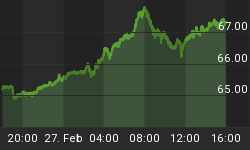There is just far too much attention being paid to the so called Fiscal Cliff occurring at the end of this year. The expiration of the "Bush era" tax cuts and forced spending reductions taking place because of the Sequestration, really doesn't amount to much more than a fiscal speed bump. In fact, less government spending is one of the pathways to prosperity; rather than becoming some make-believe economic catastrophe. And although raising tax rates isn't an optimal solution, there could still be a small benefit if there was a resulting increase in revenue, which then served to reduce annual deficits and began to address our long-term fiscal imbalances.
However, there is indeed a real fiscal cliff that the United States is racing towards. It's the very same cliff that Europe has already dived over. That cliff is based on the collapse of our debt and dollar markets, resulting from the lost faith on the part of international investors. And that loss of faith is being greatly facilitated by our Federal Reserve.
The Fed has been on an avowed inflation quest since 2008. They have sought inflation by systematically seeking to destroy the value of the dollar. By already printing trillions of dollars and now threatening to print even more, Mr. Bernanke has not only crumbled our currency but has also ruined the purchasing power of the middle class. But the worst part of the central banks' assault on our nation is the fact that Bernanke has been a tremendous enabler of the U.S. government's fiscal irresponsibility. He has duped our leaders into believing they can borrow an unlimited amount of money at nearly zero cost indefinitely.
I wrote this ominous warning back in May of 2010:
However, a temporary reprieve from significantly higher yields has been given courtesy of Europe. Investors are fleeing Greek debt and the Euro currency in favor of the U.S. dollar and our bond market. But this is a temporary phenomenon and in no way bails out America from its own fiscal transgressions. In just a few years our publically traded debt will reach nearly $15 trillion. If interest rates just rise to their historic averages, the interest on our debt (depending on the level of economic growth and tax receipts) will absorb anywhere from 30-50% of total Federal revenue. If we indeed reach that point, massive monetization of the debt may be deployed by the Fed in a vain effort to keep rates from spiraling out of control.
Back in 2010 I calculated that U.S. publicly traded debt would become unmanageable by 2015. We are moving ever closer to fulfilling that prediction, as our publicly trade debt has just soared past $11 trillion. In fact, since the recession began in December 2007, the amount of publicly traded U.S. debt has increased by 117%! Since the Fed has managed to temporarily and artificially manipulate interest rates lower throughout that increase of debt, the government believes there is no rush to change its borrowing and spending addiction. However, there is a limit to how much a country can borrow with impunity. If you debate that point just ask the Greeks, Spanish, Portuguese, Irish and Italians.
But now Boston Fed president, Eric Rosengren, has just predicted our central bank will not only cease paying interest on excess reserves, but will also commit to an open-ended form of counterfeiting. He believes QE III should be results orientated in that the Fed should obligate itself to continue to print money until the unemployment rate and nominal GDP hit their--yet to be named--specified targets.
The only problem with that is boosting nominal GDP requires boosting inflation; and rising inflation serves to raise the unemployment rate, not bring it down. So there is a conflict that the Fed is completely unaware of or refuses to acknowledge.
History has proven that no matter where it is tried, massive central bank intervention to control interest rates and rescue the economy increases the number of those who are unemployed. That tactic is failing miserably now in Europe and has utterly failed here in the U.S.
With central banks now acting in unison to garner complete control of interest rates, the only mechanism available that will eventually force them to stop piling on more debt is the repudiation of fiat currencies that back those bonds on the part of the free market.
Central banks across the globe are about to launch a coordinated effort to boost inflation. And Pento Portfolio Strategies has now nearly fully prepared our clients for a global and unprecedented attack against deflation. You would be wise to prepare accordingly.















